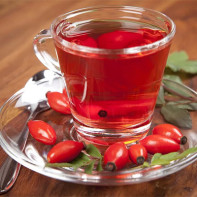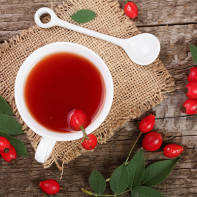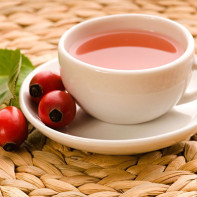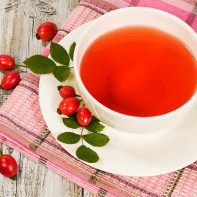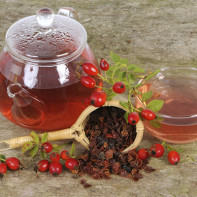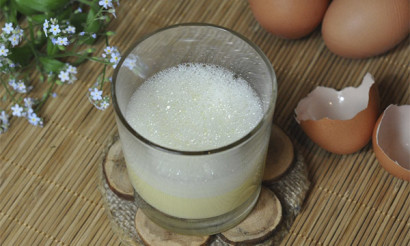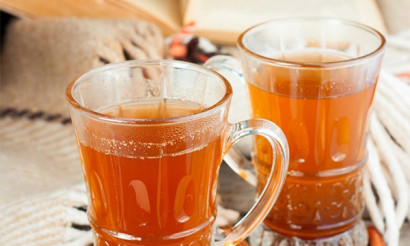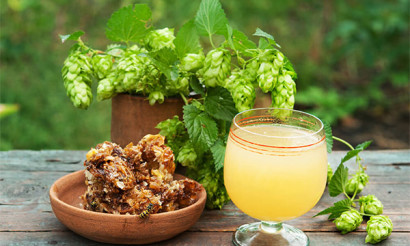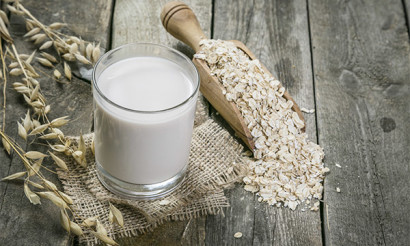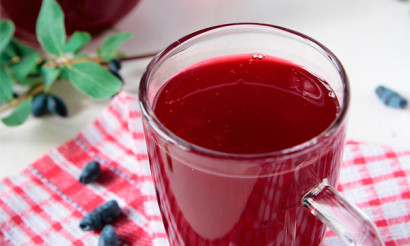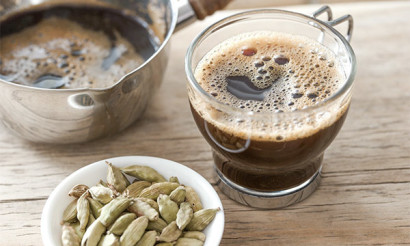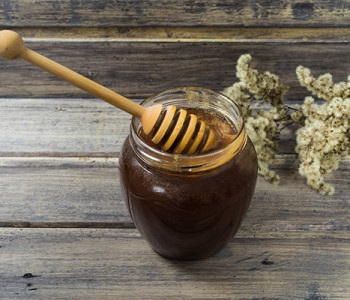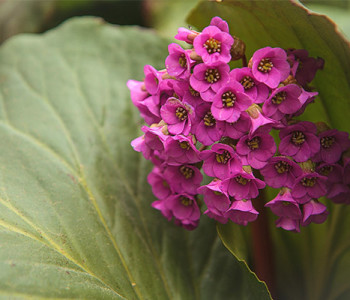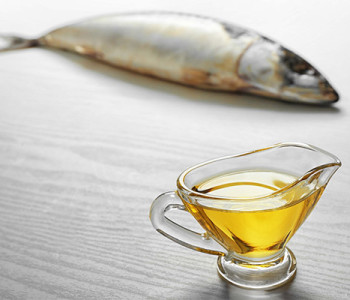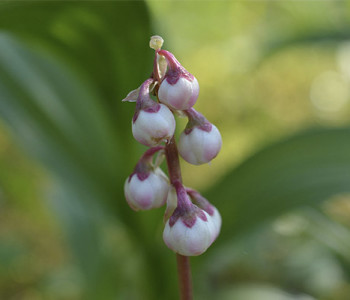Rosehip broth: health benefits and harms
The dogrose plant is known to everyone, but few people know how useful the decoction prepared from its fruits. The article will describe the beneficial properties and contraindications of this drink.
- Composition and calorie content
- What is useful broth hips
- General benefit
- For women
- For men
- During pregnancy
- When breastfeeding
- For kids
- When losing weight
- Rosehip broth in medicine
- With diabetes
- With pancreatitis
- With gastritis
- For the intestines
- For constipation
- With gout
- With colitis
- For the liver
- With cholecystitis
- With a cold
- From jaundice
- With hypertension
- In case of poisoning
- With anemia
- Rosehip broth in cosmetology
- For face
- For hair
- Harm and contraindications
- How much can you store a rosehip broth
- How to cook a rosehip broth
- Fresh berries
- From dried fruit
- From the roots
- In a thermos
- In a slow cooker
- How many times can I brew a rosehip
- How to take a rosehip broth
- How much can I drink per day
- Can I drink at night and on an empty stomach
- Interesting facts about wild rose
Composition and calorie content
In 100 ml of a rosehip broth contains only 20 kcal. The drink contains 4.5 g of carbohydrates, 0.3 g of protein and 0.1 g of fat. When sugar is added, the amount of carbohydrates and calories will change. The fruits of the plant contain vitamins A, B, E, C, PP. The chemical composition is represented by such elements as sodium, magnesium, potassium, zinc, iron, phosphorus, calcium, etc. Organic rose, dietary fiber, starch and ash are present in the composition of wild rose.
What is useful broth hips
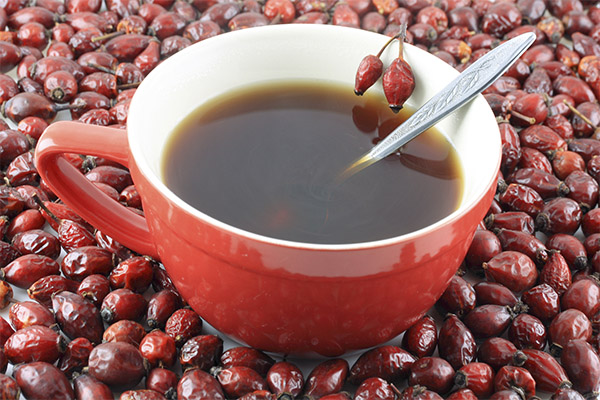
General benefit
Since ancient times, people have actively used rose hips for various purposes. In our time, it is impossible to deny the positive effect on the body of these berries, the main benefit of the decoction of which is the following properties:
- helps strengthen immunity;
- calms the nervous system;
- improves blood flow and speeds up metabolism;
- has an antimicrobial effect and helps to reduce inflammation;
- strengthens the walls of blood vessels;
- is a diuretic, choleretic, as well as a hemostatic agent;
- allows you to maintain visual acuity;
- has a positive effect on the hormonal background.
For women
It is important for the fair sex to feel attractive. A rosehip drink has a positive effect on a woman’s body, which manifests itself in the following changes:
- reduces skin peeling, inflammation;
- helps to eliminate acne;
- eliminates brittle nails;
- improves hair condition;
- increases the production of collagen necessary for skin elasticity and the elimination of fine wrinkles.
The components that the rose hip contains normalize the nervous system, therefore, the risk of depression is reduced.
For men
Broth is used to prevent many diseases that affect the male body:
- stroke;
- myocardial infarction;
- hypertension and atherosclerosis;
- abnormal cholesterol level;
- urogenital system problems;
- prostatitis.
Adherents of the traditional method of treatment believe that regular consumption of a rosehip drink helps restore potency.
Doctors recommend the use of rose hips as part of complex therapy along with medications.
During pregnancy
Pregnancy is not a contraindication for taking a drink from rose hips if the expectant mother does not suffer from diseases in which this drink is contraindicated.
Experts recommend using a decoction during pregnancy in a certain dosage. Uncontrolled intake can lead to leaching of calcium from the body of a woman, which is especially necessary for the child for normal intrauterine development.
However, the benefit to the body from moderate intake exceeds the possible harm due to important properties:
- The dietary fiber contained in the rosehip helps to gently cleanse the intestines, freeing it of toxins and toxins.
- The high content of vitamin C helps to strengthen the immune system and is an excellent prevention of colds.
- Vitamin A is necessary for a pregnant woman, but its use in large quantities can disrupt the normal development of the baby. For this reason, pharmacy vitamin complexes should be taken with caution. Vitamin A (carotene), which is found in wild rose, is not able to harm a child.
In addition, the use of a decoction allows you to:
- lower cholesterol;
- prevent the appearance of puffiness;
- normalize blood pressure;
- maintain iron levels;
- inhibit the development of anemia.
When breastfeeding
The lactation period is no less important for an already born baby. Mothers need to take care of their health and prevent the occurrence of diseases, since pathogenic microbes can penetrate into breast milk.
The moderate use of a rosehip drink is indicated for the following reasons:
- Ascorbic acid, which is part of the rosehip, helps to strengthen the immunity of a nursing woman.
- Magnesium reduces cramps and has a positive effect on blood vessels and heart rate.
- Vitamin E normalizes hormonal levels.
- Infusion helps to increase the volume of breast milk.
Rosehip can cause allergies in infants, so a woman needs to start taking a decoction with caution, you should drink a few small sips and trace the reaction. If the child does not have rashes and colic, then you can increase the amount of drink.
For kids
In childhood, the use of broth is useful due to the high concentration of vitamin C, to maintain the daily norm of which it is enough to eat 10 berries.
Many believe that a rosehip decoction at the initial stage of a cold helps to avoid serious consequences and contributes to a quick recovery.
The drink is indicated for children in the following cases:
- with a disease of the digestive system;
- weak hair growth;
- lack of iron in the blood;
- jaundice.
Due to the high likelihood of an allergic reaction, experts recommend limiting the use of a rosehip drink to children under six months of age. Enter the broth carefully, during the day, be sure to observe the reaction.
When losing weight
The broth has a low nutritional value, so you should not refuse it during the fight against extra pounds. A drink made from rose hips helps normalize metabolic processes, removes toxins and toxins, and also helps lower blood cholesterol.
In order not to increase the calorie content of the drink, it should be consumed without sugar-containing additives.
Rosehip broth in medicine
Rosehip is recognized by both scientific and folk medicine. Today, there are a huge number of drugs containing the extract of a medicinal plant.
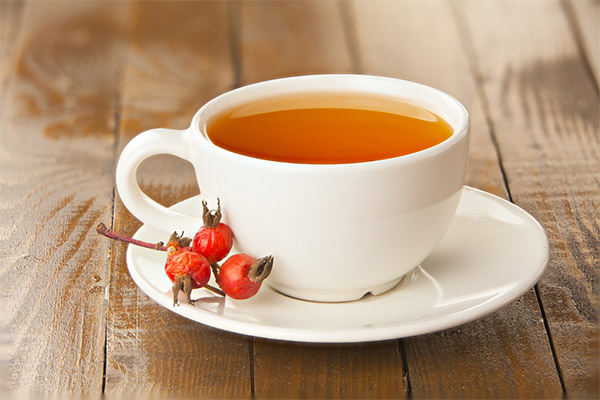
With diabetes
To date, there is no cure for diabetes, drugs can maintain a stable condition of the patient. Rose hips have a low glycemic index (20–25 units), so diabetics should not give up the broth prepared from them.
In addition, wild rose contains important components for patients with diabetes:
- iron (helps to normalize the level of hemoglobin in the bloodstream);
- zinc (ensures the normal functioning of pancreatic hormones and controls the production of insulin);
- molybdenum (normalizes metabolism);
- Manganese (contributes to the production of insulin).
The sugar content in rosehip berries depends on the area where the shrub grew. In the eastern part of our country, there are varieties of plants that contain a greater amount of sugar and starch, so it is better for patients with diabetes to abandon the use of their fruits. It is worth paying attention to the dog rose, growing in the European part of Russia. Harvesting medicinal berries can be done independently if the place of residence allows this.To do this, you must follow a number of recommendations:
- Berries should be harvested from shrubs that are removed from plants, factories, highways and landfills.
- The collection should be carried out in the period starting from the end of August and ending with the first frosts (frozen fruits contain a small amount of useful components).
- You need to dry the berries in a well-ventilated area or using a special dryer for fruits and vegetables.
The recipe for a decoction for diabetes: Pour 20 g of fruit with a liter of hot water and boil over low heat for 10 minutes. After a day, the broth is ready for use. It is recommended to drink a drink in the morning, 20-30 minutes before breakfast.
With pancreatitis
Improper and irregular nutrition can cause inflammation of the pancreas called pancreatitis. Many plants and herbs are used to treat the disease. Rosehip broth - an effective tool, time-tested.
Useful properties of a decoction for a patient with pancreatitis:
- reduces pain in the gland;
- eliminates inflammation and swelling;
- promotes healing of damaged areas.
The recipe for a decoction for pancreatitis
During an attack, the broth is prepared in the following way: 20 g of berries are poured with a liter of boiling water and left to simmer at a minimum temperature for an hour. Then the drink is allowed to infuse. Before taking the broth is diluted in equal proportions and take 50 ml in the morning and evening.
During the period of chronic exacerbation of the disease, 50 g of crushed rose hips are used to prepare the decoction, which is poured with hot water (not boiling water) and insisted on a water bath for 15 minutes. Take a decoction on the same principle as during the acute phase of the disease.
At an intermediate stage (remission), the decoction should be taken as an anti-inflammatory agent.
With gastritis
Gastritis is characterized by inflammation of the walls of the stomach, which occurs when the acidity deviates.
Before starting to take a rosehip decoction, it is necessary to undergo an examination in a specialized institution and pass the necessary tests in order to find out the acidity index of gastric juice.
With high acidity, experts do not recommend taking a decoction of rose hips.
At normal and low pH readings, a rosehip decoction helps to eliminate inflammation, restores digestion and stimulates the regeneration of damaged cells. This effect is due to the action of tannins, vitamins and pectin. These components are destroyed during boiling, so the drink must be prepared according to a certain technology:
50 g of chopped fruit is poured with a liter of hot water (not higher than 70 degrees) and heated in a water bath for 15 minutes. It is necessary to prevent the process of boiling. The prepared broth is taken chilled in 50 ml before eating. The number of receptions must be discussed with your doctor.
For the intestines
The drink has a positive effect on the intestines:
- eliminates the inflammatory process;
- removes toxins and toxins;
- eliminates pain.
To prepare the broth, the root of the plant is ground. 25 g of the obtained powder is poured into 1 liter of water. The mixture is steamed for about 20 minutes. A chilled drink is recommended to drink 30 ml in the morning and evening until the unpleasant symptoms are eliminated.
For constipation
Due to the fiber content, rose hips help soften the stool. Their ability to normalize the outflow of bile prevents the thickening and solidification of feces.
To eliminate constipation, 10 g of rosehip powder is poured into a glass of boiled water. After 2 hours, the mixture was brought to a boil. The broth is cooled and filtered through cheesecloth. Take twice a day for half a tablespoon in the morning and evening until the constipation is eliminated.
With gout
The disease is associated with a violation of the metabolism of natural substances (purines), as a result of which accumulation of uric acid crystals occurs in the joints.
It is not possible to cure gout by the methods of traditional medicine, it is possible to reduce the symptoms of the disease, normalize the hormonal background and stabilize the processes of the endocrine system.
Gout is accompanied by severe pain, which the rosehip broth can reduce. To do this, it is recommended to use it at an early stage of the disease. In severe form, the infusion is ineffective.
Gout Recipe: 25 g of the fruit of the plant is sent to a pan with hot water, covered with a lid and insisted for at least 8 hours.
With colitis
Rosehip is used as an anti-inflammatory agent for colitis. The healing components that make up the berries of the plant have a strengthening effect on the intestines. For this reason, experts recommend using a rosehip broth for colitis. It is allowed to use the infusion not only during the period of remission, but also during the acute phase.
Prescription for colitis infusion: 25 g of rosehip flowers are poured with boiling water in an amount of 200 ml and covered with a lid. The resulting infusion is recommended to use three times a day. A single dose is 25 ml. The tool helps to reduce pain.
For the liver
Rosehip has a positive effect on the liver, contributes to its restoration and supports the body in good shape. This is due to the choleretic, diuretic and anti-inflammatory abilities of the fruit of the plant.
Restoring the liver with the help of a rosehip decoction requires compliance with the following recommendations:
- Specialist consultation required.
- It is advisable to undergo a medical examination to exclude diseases in which a rosehip decoction is contraindicated.
- For a week, exclude alcohol and review the diet (refuse fatty and fried foods).
- Do not change the dose of the decoction yourself.
Recipe for a decoction for the liver: 25 g of berries are crushed, to save time, you can do this with a meat grinder. The resulting slurry is poured into 0.5 liters of liquid and sent to simmer for a couple of about 15 minutes. After this, the broth is left to insist. After 30 minutes, the resulting drink is filtered and begin to drink. It is recommended to be taken in the morning and in the evening at 100 ml for 30 days. Children should reduce the dose to 50 ml.
With cholecystitis
The benefits of rosehip are undeniable for inflammation of the gallbladder due to its incredible composition and healing properties.
Rosehip decoction should be taken with cholecystitis for the following reasons:
- relieves pain during pain;
- promotes the regeneration of affected tissues;
- reduces the inflammatory process;
- prevents the formation of stones.
Recipe for decoction: 20 g of dried berries are poured into 1 liter of water and cooked over low heat for 15 minutes. Chilled at room temperature, the broth is ready for use. It is taken three times a day in 100 ml.
With a cold
The common cold is one of the most common diseases. The benefits of rosehip from this ailment are enormous: a decoction reduces the inflammatory process, strengthens the immune system and accelerates the recovery of the patient.
Recipe for a cold 25 g of the fruit is poured with water in an amount of 500 ml and boiled for two minutes. The cooled infusion is ready for use. You can enhance the positive effect with the help of honey and lemon wedges.
From jaundice
Jaundice is a common ailment of newborn children, in which the skin becomes yellow. This comes from an excess of bilirubin in the blood. Skin color usually normalizes on its own within two weeks.
Treatment is necessary when the jaundice is infectious.At the same time, a rosehip broth is a good tool, but it can be given to children who have reached the age of 6 months.
The recipe for a decoction with jaundice: 20 g of powder from the berries is placed in a glass dish and pour 500 ml of water. The resulting mixture was steamed for 10 minutes. The drink is given to the baby twice a day, 7-10 ml.
Before starting therapy, it is necessary to consult a specialist. To exclude allergic reactions, the broth is introduced gradually, starting with a few drops, and the reaction of the child's body is monitored.
With hypertension
Studies have shown that a rosehip decoction is able to lower blood pressure, this is due to the following properties of shrubs:
- contribute to the expansion of blood vessels and strengthen their walls;
- stabilize the work of the heart;
- normalize the duration of sleep.
Regular use of the decoction not only contributes to the normalization of pressure, but also improves the blood supply process.
The recipe for a decoction for hypertension: 25 g of chopped rosehip roots are poured into 500 ml of hot water and boiled for two minutes. When the broth cools down, it is again brought to a boil and removed from the stove. After three hours, you can begin to start therapy. It is recommended to take a decoction in the form of heat, 50 ml 3 times a day.
In case of poisoning
The healing fruits of the bush contain a significant concentration of ascorbic acid, which helps to strengthen the body, which is extremely necessary in case of poisoning. Also, a decoction of fruits favorably affects the digestive system and gently removes toxic substances released when a poisonous product is consumed.
In addition, rose hips can be used for children, women during pregnancy and lactation, when pharmacy drugs have many contraindications.
Poisoning decoction recipe
- For adults. 5 tablespoons of rose hips are added to 1 liter of water. The resulting mixture is boiled for about 10 minutes. It is recommended to drink a chilled drink in the morning and in the evening at 0.5 cups.
- For kids. A teaspoon of berries is poured with a glass of boiling water, cooled and given to the child. For children over two years old, it is allowed to add the fruits of the bush to weak tea.
The child’s body is prone to allergic reactions, so they begin to give a drink in a small portion. If there is no reaction, then the volume can be increased.
With anemia
Anemia is characterized by a decrease in the number of red blood cells in the blood. In another way, the disease is also called anemia. As a result of a decrease in hemoglobin, the body experiences oxygen starvation. In this condition, a person feels a feeling of weakness, dizziness and headaches.
Daily use of a rosehip decoction will allow to normalize the level of hemoglobin thanks to the iron, which contains the fruits of the bush.
Recipe for anemia decoction: 25 g of rosehip berries are poured into 500 ml of boiling water and sent to the stove. Cook the broth in a water bath for 15 minutes. Ready broth is recommended to use twice a day for 50 ml. You can diversify the taste of the drink with the help of honey or dried fruits.
Rosehip broth in cosmetology
For face
Due to the content of vitamins A and E, rose hips are widely used in the beauty industry. These substances are natural antioxidants that perfectly cope with the signs of aging and give the skin a fresh and well-groomed appearance.
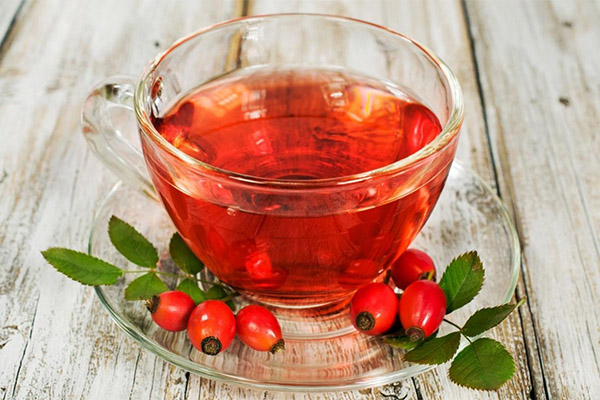
To prepare a natural anti-wrinkle remedy, you will need only two ingredients: dried fruits and plain water. 75 g of berries are poured into 500 ml of liquid and boiled for 20 minutes. The broth is insisted for at least 6 hours.
Infusion is used for the skin in various ways:
- Brush the skin with a cotton pad, without affecting the area around the eyes. The procedure can be performed daily.The skin becomes smooth and takes on a healthy look.
- The broth is poured into an ice mold and frozen. Cooked cubes are recommended to wipe the face every morning. This procedure not only brings the skin into tone, but also fights acne perfectly.
The effect is enhanced by the addition of essential oils. They can be purchased at a pharmacy or cosmetics store.
Mask for dry skin
Ingredients:
- rosehip broth - 2 tsp;
- vegetable oil - 2 tsp;
- raw egg yolk - 1 pc.
Cooking method: mix used components until smooth.
Apply the resulting composition in massaging movements on the face. Therapy should be continued for 10-15 minutes.
Mask for oily skin
Ingredients:
- raw egg white - 1 pc.;
- rosehip broth - 3 tsp
Cooking method: beat the protein thoroughly and gradually introduce the broth.
Apply the composition to the face. Therapy is carried out for 10 minutes, after which the active composition is washed off.
Cleansing mask
Ingredients:
- fat sour cream - 25 g;
- rosehip decoction - 25 ml;
- lemon juice - 25 ml.
Cooking method: mix components thoroughly and apply on face. The duration of the procedure is 20 minutes.
Wrinkle mask
Ingredients:
- rosehip decoction - 25 ml;
- flower honey - 1 tsp
Cooking method: mix the components thoroughly until smooth. Apply the composition to the face without affecting the skin around the eyes and lips. After 15 minutes, wash off the mask.
Since honey is a strong allergen, it is recommended to test the mask on a small area of the skin. In the absence of redness, you can proceed to the procedure.
For hair
The following components of the rose hip have a beneficial effect on the hair structure and scalp:
- vitamins eliminate brittleness and protect against negative environmental effects;
- essential oils protect against ultraviolet exposure;
- molybdenum prevents hair loss;
- Manganese soothes the skin;
- carotene moisturizes and nourishes the hair roots;
- glycerin helps eliminate dandruff.
With the help of rose hips you can add shine to your hair. Owners of light curls should use the broth with caution, it is able to give the hair a dark shade.
Rinse hair broth
A decoction is used as a means to combat dandruff. For this purpose, it is used after each wash.
Cooking method: 3 tablespoons of fruit pour a liter of water and boil for 15-20 minutes. The cooled broth is ready for use.
Mask with rosehip and henna
Ingredients:
- colorless henna - 2 tbsp .;
- rosehip broth - 2 tablespoons
Cooking process: mix the ingredients thoroughly. Distribute the resulting slurry over the entire length and cover your head with a plastic cap. After 40 minutes, rinse off the mask.
The mask helps to reduce the production of sebum, due to this, the hair retains a fresh look longer.
Rosehip hair coloring
To prepare the coloring composition, it is necessary to grind 75 g of dried rosehips. Dilute the resulting powder with 100–125 ml of boiling water. After two hours, you can begin the staining procedure.
The resulting mass must be distributed over the entire length of the hair and leave for 60 minutes. After time, rinse hair thoroughly. As a result of this procedure, they acquire a golden hue.
Mask with a rosehip broth
Ingredients:
- rosehip broth - 50 ml;
- honey - 25 g;
- lemon juice - 25 ml.
To achieve a thick consistency, add flour to the mask.
Cooking method: combine the ingredients and mix thoroughly.
The resulting mask is evenly distributed over the entire length of the hair and left for 15 minutes.
Harm and contraindications
Before using a rosehip decoction for medicinal purposes, a specialist consultation is necessary, since a drink made from medicinal fruits has a number of serious contraindications:
- increased acidity of the stomach (due to the high content of vitamin C);
- risk of developing a blood clot;
- diseases of the cardiovascular system.
Under the influence of a large amount of vitamin C, obstructive jaundice may develop.
Decoction can cause serious allergic reactions, such as redness of the skin and the appearance of a rash, as well as leaching of calcium from the body. High concentration ascorbic acid can destroy tooth enamel, so it is recommended to use the decoction through a tube.
How much can you store a rosehip broth
Healing drink is not recommended to be stored for a long time. To get all the benefits of using a decoction, you must take it immediately after cooking.
If necessary, postpone the drink to be removed in the refrigerator, but for a period of not more than 24 hours. After this time, a significant part of the beneficial properties of the drink is lost.
How to cook a rosehip broth
There are many ways to make a healthy drink. The article will present the most common options.
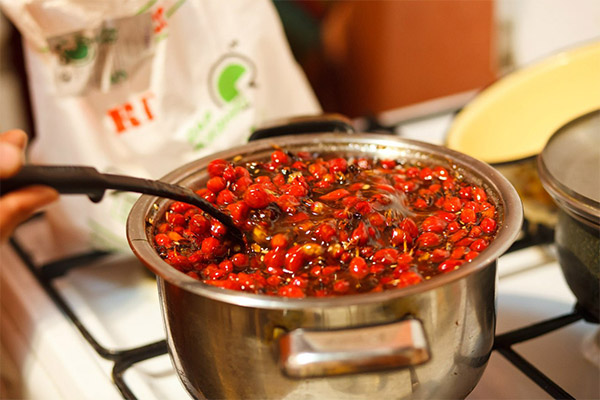
Fresh berries
A decoction made from fresh fruits, allows you to save all of its most valuable properties.
Cooking method
- Cut the prepared berries into two parts and get the seeds.
- Grind the extracted raw materials with a fork and send into hot water. The temperature of the liquid should not be more than 60 degrees. For 10 g of seeds, it is enough to use 200 ml of water.
- Leave to infuse for an hour, then strain.
Prepared in this way, the broth retains the highest concentration of useful components.
From dried fruit
To use the healing properties all year round, the berries are dried. You can do this yourself using a dryer or oven, and the process is carried out in a well-ventilated area. It is important to collect fruits that grow away from landfills, roads and industrial facilities.
Cooking method
- 1 teaspoon of powder obtained by grinding dried fruit, pour 500 ml of hot water, the temperature should not exceed 60 degrees.
- After 40 minutes, the infusion is ready for use.
From the roots
The roots of the plant are used in milled form. For 10 g of crushed raw materials, it is recommended to use 400 ml of liquid. The mixture is allowed to steam for about 15 minutes. A fully cooled drink is ready to drink.
A decoction of the roots is used for high blood pressure, diseases of the digestive system and the cardiovascular system.
In a thermos
Since metal dishes have the ability to enter into a chemical reaction, you should use a thermos with a glass flask to prepare a decoction. The method is incredible simplicity and convenience.
For cooking, just pour the rosehip berries with boiling water, cover with a lid and leave to infuse for one hour. 1 liter of water is used per tablespoon of fruit.
In a slow cooker
Extinguishing and heating functions are present in almost any multicooker. They are perfect for preparing a medicinal decoction.
Ingredients:
- rose hips - 200 g:
- water - 1.5 l.
Cooking method
- Place the washed berries in the bowl of the crock-pot and pour cold water on it.
- Turn on the extinguishing mode and set the timer for 40 minutes.
- After the required time has elapsed, turn on the heating mode for 30 minutes.
How many times can I brew a rosehip
Rosehips are recommended to be brewed once. When liquid is added, beneficial components are diluted, and the healing effect is reduced.
How to take a rosehip broth
In the matter of taking a drink, it is important to observe the measure. Uncontrolled use can harm the body.
After taking, it is necessary to rinse your mouth, this will protect against the destructive effect of ascorbic acid on the tooth enamel.
The use of parsley, dill and celery while taking a decoction helps to mitigate the effects of the components of the drink on the digestive system.
How much can I drink per day
It is important to consider the age when using the infusion and the nature of the ailment:
- children from 6 months to 1 year - 10 ml 3 times a day;
- from 1 to 2 years - 25 ml 2-3 times a day;
- from 3 to 12 years - 50 ml 2-3 times a day;
- from 12 years - 100 ml 2-3 times a day.
Can I drink at night and on an empty stomach
The infusion can be used on an empty stomach, but after 30 minutes you need to have a bite, since the drink increases the acidity of the gastric juice. Experts do not recommend the use of a decoction before bedtime.
Interesting facts about wild rose
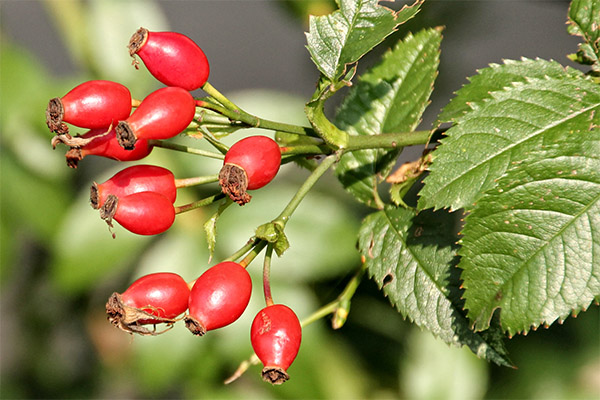
- Rosehip contains 10 times more ascorbic acid in comparison with currants. The daily intake of vitamin C is found in just 10 berries.
- The fruits of the famous shrub are called the champion among other plants for the content of nutrients.
- In England, during World War II, all children were prescribed syrup from rose hips as a fortifying agent.
- The homeland of the bush is Iran and the Himalayas. According to one legend, rose hips decorated the garden of the fertility goddess Aphrodite.
- In the world there are about 50 thousand varieties of rose hips. 100 of them grow in our country.
- In Russia, unique varieties of plants grow that are not found in other countries.
- Shrubs of certain species can reach ten meters in height.
- In Germany, the oldest rosehip grows. Its age, according to various sources, ranges from 450 to 1000 years. The diameter of the trunk reaches 50 cm. The height of the oldest rose is about 12 meters.
- Rosehip grows in the USA, called Rose Banks; it occupies a huge area of 730 square meters.
- In France, a rosehip variety is common, which has the ability to take the form of vines during the summer period. French rosehip has an unpleasant fetid odor.
- The shrub has the ability to bloom several times a season under favorable environmental conditions.
- Rosehip broth has a beneficial effect on the face and hair.
- Using a powder made from dried fruits, you can change the shade of the hair.
- Wild rose is the second name of the bush.
- Blackthorn is one of the varieties of rose hips.
- By the flowers of the bush you can navigate in time. Their petals open at about 6 in the morning and close at about 8 in the evening.
- Excavations in Switzerland showed that an ancient man ate berries of a bush even during the ice age.
- Starting from the 17th century, a decoction of shrubs was used to treat wounds in everyday life and during wars.
- For the manufacture of 1 kg of rosehip oil, it is necessary to process 3000 kg of petals.
- In the time of Ivan the Terrible, rosehip berries were of high value; only wealthy merchants and boyars could afford them.
- In ancient times, people believed in the magical power of shrub flowers. They were used during pagan rites. It was believed that the dog rose is able to establish relations between spouses and return lost feelings.
«Important: all information on the site is provided exclusively in fact-finding purposes. Before applying any recommendations, consult with a profile specialist. Neither the editors nor the authors are liable for any possible harm caused materials. "

